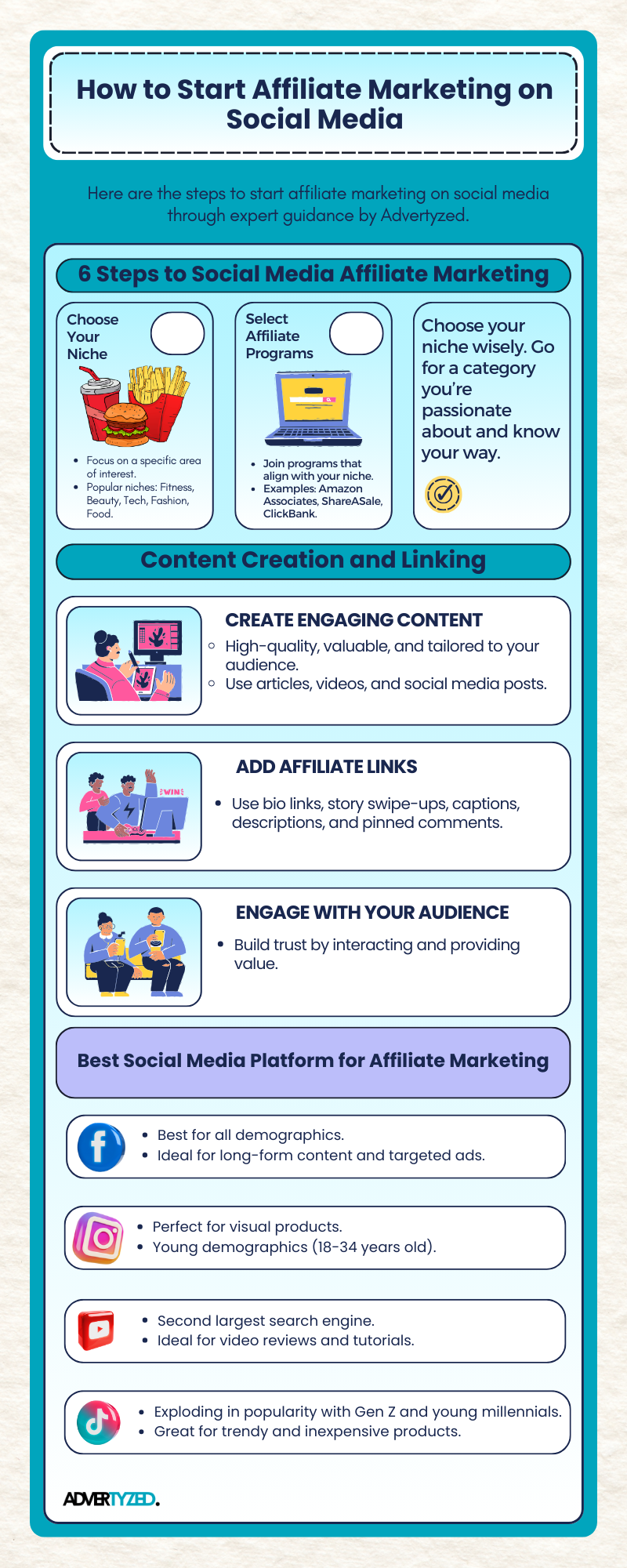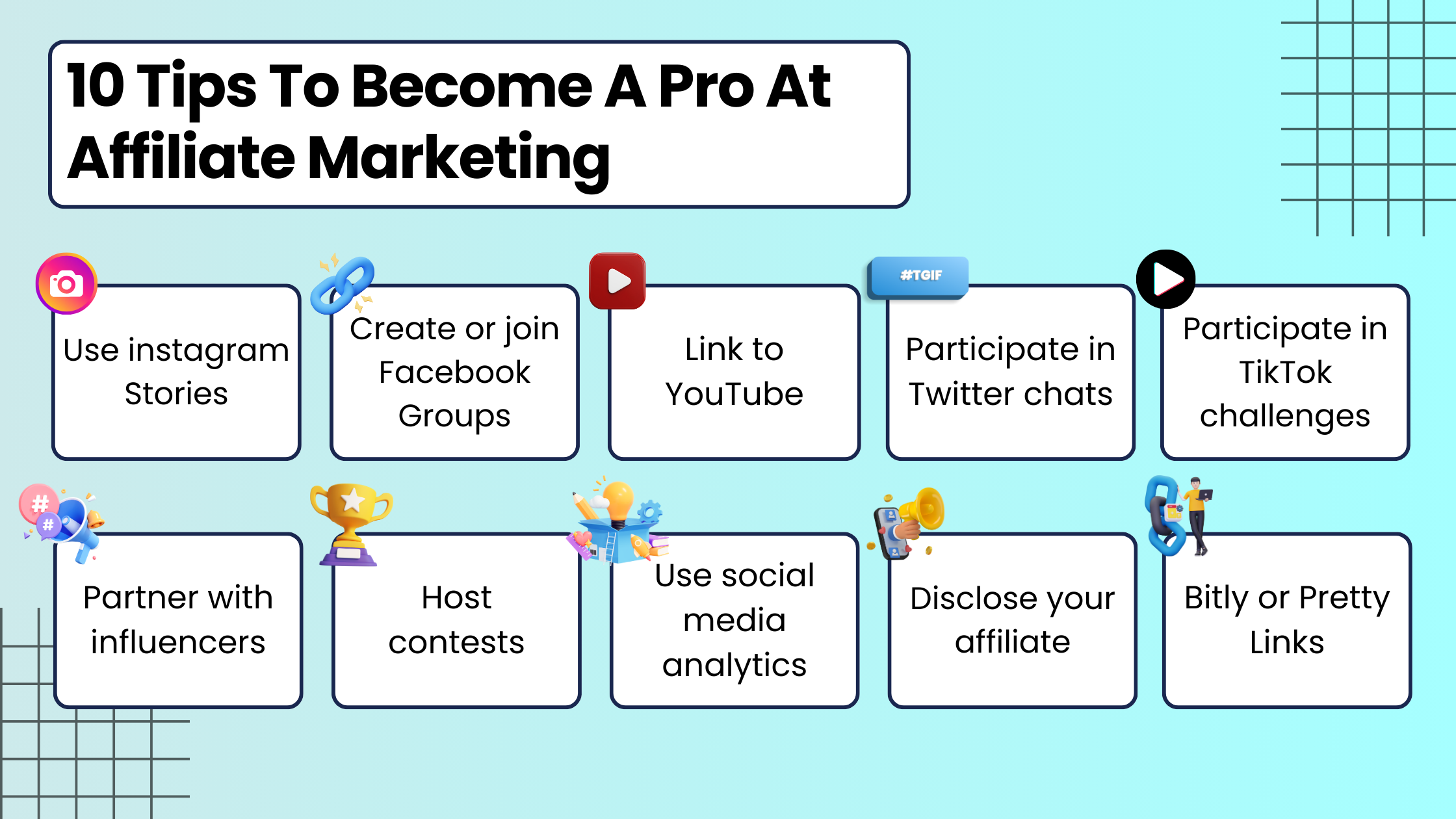Are you someone who’s looking for ways to make money online or a business seeking higher sales? In today’s fast paced world, affiliate marketing is quickly becoming one of the most profitable opportunities for businesses and individuals to reach new audiences.
With billions of people scrolling through platforms like Facebook, Instagram, Twitter and TikTok, affiliate marketing can help you reach a massive audience and earn commissions by promoting products you love.
This guide will provide a comprehensive overview on how to do affiliate marketing on social media. We’ll cover everything from the basics to some ninja-level strategies to turn you into a social media affiliate marketing pro!
So without further ado, lets understand what Affiliate Marketing actually is?
What Is Affiliate Marketing?
Affiliate marketing is a performance-based marketing strategy where individuals (also known as affiliates) promote products or services of a business and earn a commission for each sale generated through their referral links. In simpler words, it’s a means to earn money by recommending products you like to other people.
Imagine you’re raving to your friend about how you lost ten pounds in two weeks thanks to an amazing new workout app. Now, if they sign up because of your recommendation, you might get a little bonus from the said app. That’s affiliate marketing in action!
Typically, there are four key players involved in the affiliate marketing process:
- Merchants: Businesses or individuals who create the product or service.
- Affiliates: Marketers who promote the product or service.
- Consumers: Individuals who purchase the product or service through the affiliate’s link.
- Affiliate Programs: Platforms that connect merchants with affiliates.
These key players all work together to create a successful affiliate marketing ecosystem. Affiliates act as a bridge to connect businesses with their potential customers. Whereas affiliate networks, while not always essential, can streamline the process by connecting merchants with a vast pool of potential affiliates and vice versa.

How To Do Affiliate Marketing On Social Media
Enough chit chat about the ABC, let’s get into how to do affiliate marketing on social media? Here’s a step-by-step guide to help you get started on your journey in affiliate marketing. By following these steps, you can effectively use social media for driving traffic and conversions while building a strong connection with your audience.
1. Choose Your Niche
Before you start affiliate marketing on social media, you must select a niche that you are passionate about and that has a vast enough audience on social media. Popular potential affiliate markets include:
- Fitness and health
- Beauty and skincare
- Technology and gadgets
- Fashion and accessories
- Food and cooking
These niches aren’t easy to rank for on social media but bear the most fruit. If you consistently post content and optimize your hashtags, scoring a reputation on social media under these niches would become a breeze.
2. Select Affiliate Programs
Once you have your niche, it’s time to join an affiliate program that aligns with your goals. Affiliate programs are platforms where businesses reward affiliates for driving traffic or sales to their website through the affiliate’s marketing efforts. These promotions are done through unique tracking links, and in turn earn a commission for each sale generated through their link is shared with the affiliate. Some popular affiliate networks include:
- Amazon Associates
- ShareASale
- Commission Junction (CJ)
- Rakuten Marketing
- ClickBank
3. Create Engaging Content
Although all steps of affiliate marketing are equally important, this one is the most time and effort consuming. Your content must be valuable, engaging, and tailored to your audience’s interests and needs. Focus on producing high-quality articles, videos, and social media posts that provide real insights and benefits. This requires thorough research, presenting information clearly, and using appealing visuals.
4. Add Affiliate Links
When you have your content, it’s time to incorporate affiliate links into your content strategically. Here are few ways you can do so:
- Bio Links: Place a single link in your bio that leads to a landing page with multiple affiliate links using tools like Linktree.
- Story Swipe-ups: If you have over 10,000 followers on Instagram, use the swipe-up feature in stories.
- Captions and Descriptions: Include affiliate links in post captions and video descriptions, clearly indicating they are affiliate links.
- Pinned Comments: On platforms like YouTube, pin a comment with your affiliate link.
5. Engage with Your Audience
Your affiliate marketing journey doesn’t end with infusing affiliate links in your content. In order to convince your audience to trust your word, you need to build a relationship with them. This has been explained more in detail later on in the article.
6. Analyze and Optimize
By now, you’re 80% done with your affiliate marketing journey. To reach a solid 100, you need to track your performance and optimize your strategy by using tools like social media and Google Analytics. Test different content types, posting times and other strategies to get better conversions.
Viola! By now you’ve already learned how to do affiliate marketing on social media. But with so many social media platforms available, the key to success for affiliates lies in choosing the right ones to reach your target audience. Let’s explore how you can select the best social media platform for affiliate marketing.
Choosing The Best Social Media Platform for Affiliate Marketing
Alright, by now you must be pumped about affiliate marketing and all set to give shout outs to a range of awesome products. But hold on a sec, with so many social media platforms out there, how do you know which one is the best fit for YOU? Don’t worry, we won’t leave you hanging. Here’s a roadmap to finding the best social media platform for affiliate marketing.
Know Your Audience
Before you start recommending products to your followers and give out affiliate links, make sure your audience is actually interested in the product you’re promoting. Grab a pen and a paper (or just open the notes app), and jot down answers to the following:
- What is the product that you will be promoting?
- Who is your ideal customer?
- What is their age range?
- What is their gender?
- What are their interests?
- Where do you think they spend most of their social media time?
When you have answers to all these, it will be easier for you to know which is the best social media platform for affiliate marketing.
Platform Smackdown
Now that you have a better idea of your target audience, let’s dive into the strengths of some of the commonly used social media platforms throughout the world to help you choose the best social media platform for affiliate marketing.
- Facebook:
It’s the OG social network with a massive amount of users across all demographics. Facebook is the top choice for targeted advertising, allowing you to reach a very specific audience with your affiliate promotions. Plus on Facebook, you can create long-form content like blog posts or reviews and link them back to your affiliate offers.
- Instagram:
Being the land of all things visual, Instagram is perfect for promoting products that can be showcased in stunning photos and videos. In particular, fashion, beauty, travel, and lifestyle niches thrive on this platform. The sweet spot for Instagram tends to be younger demographics, with the majority of users falling between 18 and 34 years old.
- YouTube:
As the second largest search engine in the world, YouTube is another excellent platform to promote products. Here, you can upload in-depth video reviews, unboxing and tutorials featuring your affiliate products. This platform is a great fit for reaching a wide range of demographics, particularly those who prefer video content over written text.
- TikTok:
This short-form video platform is exploding in popularity, especially with younger demographics. If your target audience is Gen Z or young millennials, and your product is something that’s trendy and inexpensive, TikTok could be a goldmine.
- Twitter:
Twitter is a fast-paced and ideal option for quick updates and discussions, Now called X, the social platform thrives on real-time engagement. You can use relevant hashtags to promote your affiliate offers and participate in conversations about your niche. The majority of Twitter’s audience (38.5%) falls under the age bracket of 25 to 34.
- LinkedIn:
This professional networking platform is a great fit for B2B products and services. If you’re promoting software, marketing tools, or other professional services, LinkedIn can be the best social media platform for affiliate marketing. The demographic on LinkedIn is usually older than some other platforms, with the majority of users falling between 25-54 years old.
- Pinterest:
Known for its visual inspiration boards, Pinterest is an ocean for promoting products that can be showcased in a creative and appealing way. This includes home decor, fashion accessories, DIY crafts, recipes or anything that can be beautifully photographed and looks aesthetically pleasing. The general audience on Pinterest comprises more females between the age of 25-34 years old.
Once you’ve decided on the best social media platform for affiliate marketing, you’re all set to be posting reviews and earning commissions. Seems too good to be true right? Well, no one would trust every TikTok, Insta, and Snap influencer when it comes to spending money and buying products.
To make people believe your word and make purchases, you need to optimize your online presence.

Here’s What You Can Do To Have A Convincing Social Media Presence
Apart from your friends and family, none of the 5.17 billion social media users know you personally and are therefore less likely to trust you when you recommend them a product. So why do we buy stuff that influencers recommend to us?
That’s because most influencers have a solid online presence that allows followers to connect with them. Here’s how they pull it off:
-
Building a Connection:
Influencers don’t just post product recommendations or PRs. They create engaging content, share their lives, and interact with their followers. This creates a sense of connection, making them feel relatable and familiar. Over time, you start seeing them as a friend with good taste, someone whose recommendations you might take in the real world.
-
Expertise by Association:
Many influencers focus on specific niches; fashion, beauty, fitness, etc. By continuously posting valuable content in their niche, they establish themselves as experts. When they recommend a product related to their niche, it feels like an expert’s endorsement, making it more trustworthy.
-
Optimized Social Profiles:
Influencers ensure that their social media profiles are optimized across all platforms. They include professional photos, compelling bios, and contact information to boost visibility. Additionally, some link their profiles to their websites, directing traffic and enhancing their online presence and credibility.
Now, you might not have millions of followers, but you can still leverage these tips to make your social media recommendations more believable. Remember, trust is built brick by brick, so focus on creating valuable content and genuine connections, and watch your social media influence grow.
Creating High Quality Content
Content is king in affiliate marketing. Creating engaging, valuable, and relevant content will attract and retain your audience. Here are a few ways you can utilize content to persuade your audience.
- Product Reviews
Write or create videos reviewing products honestly. Highlight the benefits, features, and potential drawbacks. Authentic reviews build trust and can drive conversions.
- Tutorials and How-To Guides
Create step-by-step guides on how to use the product. This type of content is useful and can effectively showcase the product’s value.
- User-Generated Content
Encourage your followers to create content using the products you’re promoting. This is known as user-generated content or UGC. UGC adds credibility and encourages others to purchase through your links.
- Consistent Posting Schedule
Maintain a consistent posting schedule to keep your audience engaged. Use social media management tools like Hootsuite or Buffer to plan and schedule your posts in advance.

10 Tips To Become A Pro At Affiliate Marketing
Feeling excited about diving into affiliate marketing after this guide? That’s awesome! To help you master how to do affiliate marketing on social media, here are a few pro tips to keep in your back pocket!
- Use Instagram Stories to share time-sensitive promotions and behind-the-scenes content. Save important stories in Highlights to keep them accessible to your audience.
- Create or join Facebook Groups related to your niche. Engage with members by providing value and subtly promoting your affiliate products.
- Include affiliate links in your YouTube video descriptions and use YouTube Cards to add clickable links within your videos.
- Participate in Twitter chats relevant to your niche. This increases your visibility and allows you to share your expertise and affiliate links.
- Create or participate in TikTok challenges related to your affiliate products. This can increase your reach and engagement.
- Partner with influencers in your niche to expand your reach. Influencers can introduce your products to their followers, driving traffic and conversions.
- Host contests and giveaways to increase engagement and attract new followers. Ensure the prizes are relevant to your niche and promote your affiliate products.
- Use social media analytics tools like Facebook Insights, Instagram Insights, and YouTube Analytics to monitor your performance. Track metrics like engagement, reach, and conversion rates.
- Always disclose your affiliate relationships. This can be done through hashtags like #ad or #affiliate in your posts. Transparency builds trust with your audience.
- Use tools like Bitly or Pretty Links to track the performance of your affiliate links. This helps you understand which links are driving the most traffic and conversions.
Affiliate Marketing Gurus At Advertyzed Are Pumped To Help You Out
Imagine the impact of expert guidance to your affiliate marketing efforts. Whether you’re a business or an individual, Advertyzed offers personalized strategies to help you maximize your reach and revenue. With our deep industry knowledge and proven techniques, you can navigate the complexities of affiliate marketing with confidence.
Let Advertyzed take your marketing game to another level and drive real results. We know just how to do affiliate marketing on social media to boost your online presence and increase your income. Partner with Advertyzed and experience the difference that expert support can make in achieving your marketing goals.



